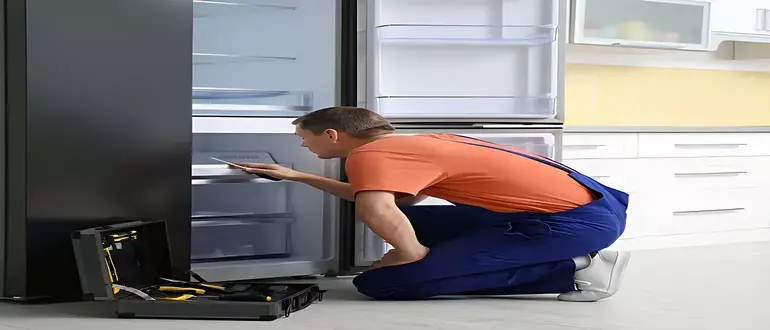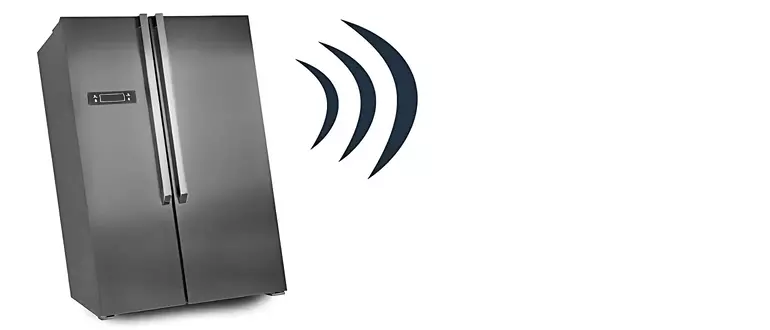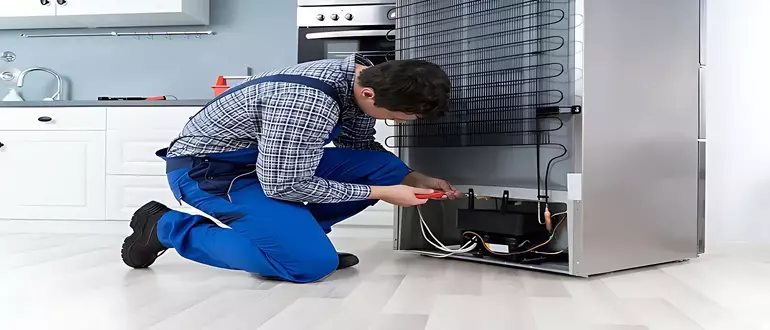Your refrigerator is an essential appliance in your home, but have you ever noticed it making a strange sound? While some noises are normal, others can indicate a problem with your refrigerator.
In this blog, we’ll explore the various sounds your refrigerator might make, what they mean, and what you can do to fix them.
Read on to learn more about how to keep your refrigerator running smoothly and quietly.

Is Refrigerator Make Strange Sound?
Yes, refrigerators can sometimes make strange sounds. Some common sounds include humming, buzzing, clicking, or knocking.
These sounds can be caused by various factors such as the compressor, fan blades, or ice maker.
If you notice a sudden change in the sound of your refrigerator or if the noise becomes extremely loud, inspected it with a professional technician.
What causes a refrigerator to make noise?

There are some potential causes for making noise,
Dirty Condenser Coils:
The condenser coils in the refrigerator are responsible for releasing heat from the system.
When these coils get dirty, they can’t function efficiently and cause the compressor to work harder, which can result in a noisy refrigerator. Clean the condenser coils regularly.
Faulty Evaporator Fan:
The evaporator fan in the refrigerator is responsible for circulating the air inside the unit.
If the fan blades get damaged or dirty, it can result in a loud noise. Replace the fan or clean it thoroughly.
Worn Out Compressor:
The compressor is the heart of the refrigerator that compresses and circulates the refrigerant through the system.
When it gets old or damaged, it can produce a grinding or buzzing noise. Fixing or replacing a compressor is a costly repair and may require professional help.
Loose Parts:
Sometimes, the noise in a refrigerator is caused by loose parts, such as the fan blade, compressor mounts, or motor mounts. Tightening or replacing these parts can often fix the issue.
Unlevelled Refrigerator:
An unlevelled refrigerator can cause a range of issues, including noise. The weight of the appliance can cause it to rock back and forth, resulting in a rattling sound.
Ensure the refrigerator is leveled correctly by adjusting the leveling feet under the appliance.
Overloaded Refrigerator:
An overloaded refrigerator can cause it to work harder, resulting in a louder noise. Ensure that the refrigerator is not overloaded with food items and that there is adequate airflow inside the unit.
Common sources of the sound

Here are the common sources of noise in a refrigerator written in a simplified subheading style:
Compressor:
The compressor is responsible for circulating the refrigerant through the system. When it gets old or damaged, it can produce a loud buzzing or grinding noise.
Evaporator Fan:
The evaporator fan circulates the air inside the refrigerator. If the blades are dirty or damaged, it can cause a whirring or squealing sound.
Condenser Fan:
The condenser fan is located near the compressor and cools down the condenser coils. When it gets dirty or damaged, it can cause a humming or rattling noise.
Defrost Timer:
The defrost timer controls the defrost cycle of the refrigerator. If it gets stuck, it can cause a clicking noise.
Water Inlet Valve:
The water inlet valve supplies water to the ice maker and dispenser. When it gets damaged, it can cause a buzzing or rattling sound.
Damaged Door Seal:
The door seal helps keep the cool air inside the refrigerator. When it’s damaged or dirty, it can cause a whistling or hissing sound.
Overloaded Refrigerator:
When the refrigerator is overloaded with items, it can cause the fan and compressor to work harder, resulting in a louder noise.
Unlevelled Refrigerator:
An unlevelled refrigerator can cause the appliance to rock back and forth, causing a rattling or vibrating noise.
DIY solutions for fixing the sound

Here are some DIY solutions for fixing the noise in a refrigerator:
Clean the Condenser Coils:
Dirty condenser coils can cause the compressor to work harder, resulting in a loud noise.
To clean the coils, turn off the power to the refrigerator and use a coil brush or vacuum cleaner to remove the dirt and debris.
Replace the Evaporator Fan:
If the evaporator fan blades are dirty or damaged, they can cause a whirring or squealing sound.
To replace the fan, turn off the power to the refrigerator, remove the fan cover, and unscrew the fan motor. Install the new fan motor and reattach the cover.
Tighten Loose Parts:
Loose parts, such as the fan blade, compressor mounts, or motor mounts, can cause a rattling noise. Tighten or replace these parts as needed.
Level the Refrigerator:
An unlevelled refrigerator can cause a rattling or vibrating noise. Use a level to check the alignment of the refrigerator and adjust the leveling feet as needed.
Clean or Replace the Door Seal:
A damaged or dirty door seal can cause a hissing or whistling noise. Clean the seal with warm soapy water or replace it if it’s damaged.
Replace the Water Inlet Valve:
If the water inlet valve is damaged, it can cause a buzzing or rattling sound. To replace the valve, turn off the power to the refrigerator and water supply, disconnect the water lines, and remove the valve. Install the new valve and reconnect the water lines.
Reduce the Load:
An overloaded refrigerator can cause the fan and compressor to work harder, resulting in a louder noise.
Remove unnecessary items to reduce the load and ensure there is adequate airflow inside the unit.
Maintenance tips for a quieter fridge

Some of the maintenance tips can help to keep your refrigerator running quietly:
Clean the Condenser Coils:
As mentioned before, dirty condenser coils can cause the compressor to work harder and produce more noise. Regularly clean the coils to prevent this from happening.
Check the Door Seal:
Ensure that the door seal is clean and undamaged. A damaged or dirty seal can cause cool air to escape, leading to the compressor working harder and producing more noise.
Keep the Refrigerator Level:
An unlevelled refrigerator can cause the appliance to rock back and forth, resulting in more noise. Use a level to check the alignment of the refrigerator and adjust the leveling feet as needed.
Replace the Water Filter:
Replacing the water filter at least twice a year can help prevent any build-up of mineral deposits or other contaminants that can cause the water inlet valve to malfunction and produce more noise.
Maintain a Full Refrigerator:
Maintaining a full refrigerator can help regulate temperature and reduce the workload on the compressor, leading to quieter operation. Avoid overloading the unit, as this can lead to other issues.
Schedule Regular Maintenance:
It’s always a good idea to have a professional inspect your refrigerator periodically to catch any potential issues before they become bigger problems.
They can also clean and lubricate moving parts to help reduce noise.
FAQs
How Do I Know If The Strange Sound In My Refrigerator Is Serious?
If the sound is loud, persistent, or accompanied by other issues such as temperature fluctuations or leaks, it could indicate a serious problem that needs attention.
Can I Fix The Strange Sound In My Refrigerator Myself?
Some issues, such as cleaning the condenser coil or replacing a water filter, can be fixed by the homeowner. For more complex issues, it’s best to consult a professional.
How Often Should I Have My Refrigerator Inspected?
It’s recommended to have your refrigerator inspected and maintained by a professional once a year to ensure it’s running efficiently and to catch any potential issues before they become bigger problems.
Is It Normal For My Refrigerator To Make Some Noise?
Yes, some noise is normal for a refrigerator, such as the hum of the compressor or the sound of ice cubes dropping. Any unusual or loud noises should be investigated.
Final thoughts on dealing with refrigerator sounds
Dealing with refrigerator sounds can be a frustrating experience, but it’s important to address the issue promptly to prevent any potential damage to the appliance.
By following the maintenance tips and scheduling regular inspections, homeowners can ensure their refrigerator runs efficiently and quietly.
Remember, if the sound persists or is accompanied by other issues, it’s best to consult a professional for assistance.

